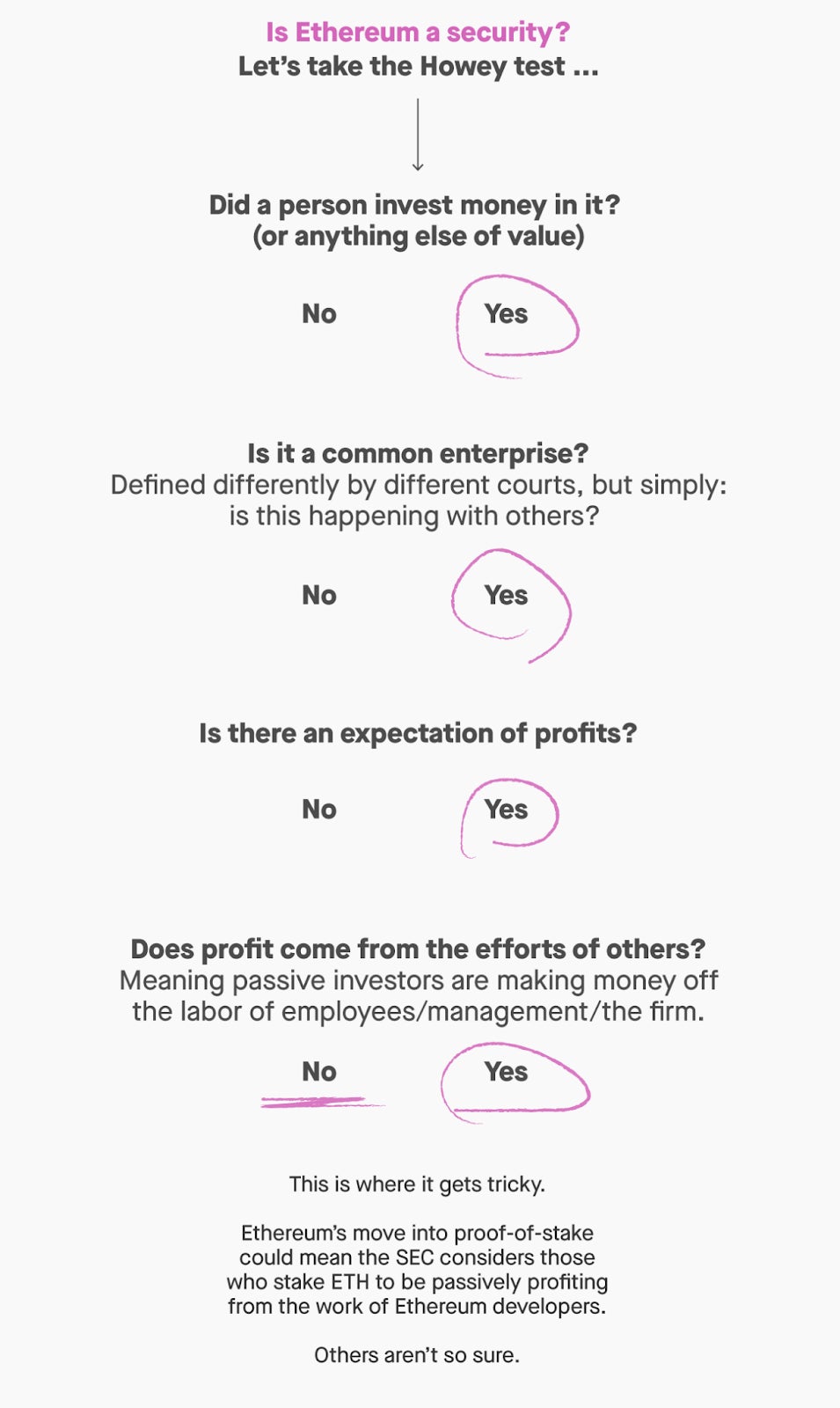Crypto laws are incoming
Penalizing Kim Kardashian is part of the US government's growing push to regulate cryptocurrencies


Hi Quartz members,
“Are you guys into crypto????” Kim Kardashian wrote in May 2021, on an Instagram story. “This is not financial advice but sharing what my friends just told me about the Ethereum Max token!”
The post, which mentioned it was an “#ad,” linked to the website of a little-known cryptocurrency called EthereumMax, encouraging Kardashian’s 200 million (at the time) followers to buy the coins.
Kardashian has long been “famous for being famous,” and this kind of post is the influencer’s stock-in-trade. But earlier this week, the US Securities and Exchange Commission (SEC) charged Kardashian for promoting the cryptocurrency without proper disclosures.
In the US, influencers have to adhere to advertising disclosure guidelines set by the Federal Trade Commission (FTC). But the bar for such compliance is low; even writing “#ad,” as Kardashian did, can be enough to avoid the claws of the regulators.
The SEC, though, has different rules if you get paid to promote what it considers securities. There is an obvious ethical problem with celebrities and influencers selling junk financial products to their followers. (EthereumMax has since lost 99% of its value.) But there is also a legal red line that Kardashian crossed, whether or not she was aware of it. The SEC mandates that paid promoters of securities disclose not only that the content is sponsored but also the amount that the promoter is being paid. As a result, Kardashian had to pay $1.26 million to settle the charges, cooperate with federal investigators, and agree to not promote crypto securities for three years.
The Kardashian mini-saga is a flashy move from government regulators—and specifically from the SEC, which has signaled an increased willingness to go after crypto in recent months. But it’s also emblematic of the US government’s broad-based attempt to rein in the caprices of an industry that sold itself as an alternative financial system outside the grasp of central banks and regulators. Kardashian was swept up in the effort to regulate crypto because, well, nobody really knows how this will play out. The crypto industry is lobbying heavily for favorable regulation. In the interim, enforcement decisions, such as the one Kardashian was hit with, provide glimpses of the emerging regulatory regime.
THE BACKSTORY
- The US government has taken a whack-a-mole approach to regulating crypto in recent years. This summer, it has intensified its efforts. In June and July, the Justice Department brought insider trading cases against employees of the NFT platform OpenSea and the crypto exchange Coinbase, applying wire fraud, money laundering, and securities fraud statutes to prosecute individuals who profited off of nonpublic company information.
- In August, the Treasury department sanctioned Tornado Cash, a decentralized piece of software used by North Korean hackers to launder stolen money from the crypto game Axie Infinity. What was odd about the decision was that it didn’t name any sanctioned companies or individuals—just software and some anonymous crypto wallets.
- In September, the Commodity Futures Trading Commission (CFTC) sued a crypto company called bZeroX and its founders for illegally selling commodities and futures. But it also sued a decentralized autonomous organization, or DAO, that the founders set up explicitly to avoid regulation. It’s still unclear whether any voting members of the DAO will face charges, although the CFTC said they are liable. As with the Tornado Cash sanctions, the government here signaled that people cannot hide behind the specter of decentralization and avoid legal liability.
SECURITY BLANKETS
Gary Gensler, the SEC chairman, recently said that the “vast majority” of cryptocurrencies are securities, although he posited that bitcoin, the primordial crypto, is likely a commodity outside of his current purview. (Gensler previously chaired the CFTC.) Gensler’s position hasn’t changed all that much on crypto in recent years, even if his fangs are out now. “The investing public is clearly hoping for possible appreciation,” Gensler said at a 2018 conference hosted by MIT. “When you quack like the duck, when you swim like the duck, when you walk like the duck... I think the bird’s a duck.” Even his position on bitcoin is not new. At the same conference, he said that he didn’t believe bitcoin was a security.
At this point, Gensler has shown his hand and is following through—albeit slowly—on plans to regulate crypto. The only real question is when Gensler will move to take a bigger bite out of the crypto ecosystem.
WHAT TO WATCH FOR NEXT
- Tug-of-war. The SEC and CFTC will tussle for control of the industry. That hinges on how the government defines securities and commodities. The crypto industry prefers the CFTC, seeing it as a lighter-touch body—despite its strong action against a DAO last month. But for many large crypto companies, such as exchanges that sell a variety of coins, the reality is they’ll likely have to comply with both agencies before long.
- The Feds. The Justice Department will dispatch 150 federal prosecutors specializing in crypto crime. In a recent policy paper from the DoJ, the Biden administration announced that the DoJ would make sure these prosecutors were distributed across the nation to form what it’s calling the “Digital Asset Coordinators” network.
- A license for crypto companies. Currently, most crypto firms put up $1-1.5 million over two years to get money transmitter licenses in many US states. The industry has been pushing Congress to create a federal license that would allow companies to not have to apply in every state.
- Politicking. The US midterm elections will determine which new bills make it into law. By mid-June, the crypto lobby had already spent $31.2 million on primary races, and Coinbase teamed up with a dark money political group called the Crypto Action Network to allow users to look up the crypto-friendliness of candidates directly within the exchange’s app.
- More state policy. The California legislature recently passed a bill that would have created a stricter licensing regime for crypto companies in California. (Governor Gavin Newsom vetoed it.) The crypto lobby is going to continue to push for more favorable legislation at the state level: The National Conference of State Legislatures estimates that 37 states have passed or are working on bills related to digital assets so far in 2022.
ONE ⚖️ THING
Are cryptocurrencies actually securities? Gary Gensler, the SEC chairman, says—with few exceptions—they are. (It’s not like Gensler is currently talking about shutting down the entire industry—and even if he was, these determinations would likely be settled in the courts.) So how do you know if something is a security or not? The US Supreme Court adopted the Howey test in a 1946 court case, which determines if something constitutes an “investment contract” under the authority of the SEC.

QUARTZ STORIES TO SPARK CONVERSATION
- Why the Fed’s hikes are not showing up in your savings account
- Did Elon Musk really lose $80 million helping Ukraine?
- The Maine lobster issue demonstrates just how tricky sustainability is
- Rainbow fentanyl is a war-on-drugs tactic
- Even Shell’s CEO admitted taxes on energy companies are a way to deal with inflation
- Office buildings in NYC won’t recover from work-from-home for 10 years
- The Hans Niemann cheating mystery might be exactly what chess needed
5 GREAT STORIES FROM ELSEWHERE
🗣️ Iran’s uprising. Women and girls across Iran have been at the forefront of sweeping anti-regime protests that have gripped the country for nearly three weeks. In an essay for The New York Times, writer Azadeh Moaveni brings together her thoughts on gender, class, history, and politics, as well as personal accounts from Tehran, to explain why this is an unprecedented moment for the country, and will have a lasting impact regardless of its outcome.
↩️ Blockchain reverse. Stanford University recently argued that blockchain transactions should be made reversible in order to fight crypto crime. In a piece from Cointelegraph, anti-money laundering specialist Ben Cochrane agrees, stating that reversibility would not only help law enforcement, but also make crypto a more practical form of currency. The catch is whether mutability might defeat the blockchain’s original purpose.
🦠 Viruses, redefined. Viruses are often described as “hijackers,” overtaking cells and using them for their own replication. In a story from e-flux, Hannah Landecker, a professor at UCLA, shows us why this language misrepresents and even obscures the nature of infectious microbes. She explains that, instead, we can think of viruses as more akin to venomous sea snails, not only in a metaphorical sense, but also molecular.
🧐 SLB B.S. Corporate ESG pledges have already been the subject of a good deal of skepticism and scrutiny, and a new Bloomberg report only adds to the evidence. It finds that sustainability-linked bonds, or “SLBs,” are an easy way for companies to get cheaper financing and cop out of emissions goals while still looking good on paper. With little transparency and weak penalties, it’s no wonder some are calling the SLB market “broken.”
😎 Bond, James Bond. This past week marked 60 years since the suave superspy 007 first graced the big screen. A retrospective in Esquire explores the inspiration behind author Ian Fleming’s larger-than-life character. As it turns out, Bond is an amalgamation of several real-life operatives, from Canadian spy William Stephenson to MI5 agent Sidney Reilly, and is also imbued with some of Fleming’s own personality and experiences in British intelligence.
Thanks for reading! And don’t hesitate to reach out with comments, questions, or topics you want to know more about.
Have an unregulated weekend,
—Scott Nover, emerging industries reporter, and Nate DiCamillo, economics and finance reporter
Additional contributions by Amanda Shendruk, Ana Campoy, Julia Malleck, and Alex Citrin-Safadi.